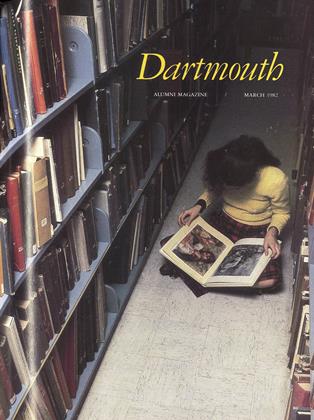LETTERS TO THE THIRD MILLENIUM: An Experiment in East-West Communication by Clinton C. Gardner '44 Argo Books, 1981. 258 pp. $7.95
Clint Gardner '44 is a familiar and esteemed figure in the Hanover-Norwich community: student and editor of the lectures of the late Professor Eugen Rosenstock-Huessy (1884-1973); president of the Norwich Center for volunteer peace projects; one-time executive officer of the American occupying forces at Buchenwald; later, managing editor of a newspaper issued by those forces for the German public. As we Scots would say, "a lad O' pairts."
So, too, was Rosenstock-Huessy, not only in his intellectual and professional accomplishments but also in his spectacular escape from the clutches of the Nazis. As an existentialist, he was something of an anomaly in our Philosophy Department from 1935 until his retirement in 1957.
The "essence" of his thinking has sometimes been encapsulated as "the higher sociology." But that is academic jargon. He was, both in his actions and his words, a prophet, like Amos or Hosea: disconcerting, out of a profound concern. He remains today a timely figure, as Gardner makes him out to be.
The title of Gardner's book is well chosen; for we all indeed ought to address ourselves to that third millenium which (according to Occidental chronology) is almost upon us. The sub-title invites us to an experiment in East-West (chiefly American-Russian) communication. I found the indices most helpful. Other readers have already commented that the book is insightful, pungent, engaging, and impressive - as it truly is - whether as an updating of the thought of Rosenstock or an introduction to that of Gardner. Parallels to Robert Pirsig's Zen and theArt of Motor-Cycle Maintenance are acknowledged.
The book as a whole is oriented to the self as much as to our coming world, our global or planetary village. In some of Gardner's own words: "The full attainment of our Planetary Consciousness requires that we respect our total experience of spaces and times: inward, outward, forward, backward. We are torn between the need to be conservative and revolutionary, between the need to dream and to be hardheaded operators. Thus we are four-dimensional toward the times and spaces of life."
Both the emphasis on the self and on the four dimensions of reality to be explored strike an authentic Rosenstock note. On the one hand, applied psychology; on the other hand, political, historical, and analytical discourse. These realms are interpreted in Gardner's book as creative human efforts, like the languages that give them effect.
One of the most engaging episodes in this tale of many cities is Gardner's recollection of a business trip to Mexico in 1978. While he was there he visited an orphanage in Guadalajara, on the dome of which Orozco had painted a mural. It recalled to him a similar one among those which Orozco had done in Baker Library, and he also recalled that he had first been awakened to the meaning of the Baker mural by reading Rosenstock-Huessy's famous Out of Revolution. Now, this is the "sea of time" in which many of us are accustomed to swim. Others, not so accustomed, have in Clint Gardner an experienced instructor to guide their first plunge.
Each of us has his own Rosenstock. Mine is fairly close to that described by Harold Stahmer '51 in his book Speak that IMay See Thee: The Religious Significance ofLanguage. In Stahmer's interpretation Rosenstock was just as conservative, or conservationist, as he was revolutionary, or rebellious - as suggested by his Latin motto: Respondeo etsi mutabor I respond although I will be changed); or by an utterance such as, "All things were made by the Word. In the beginning there was neither mind nor matter. In the beginning was the Word. St. John was properly the first christian theologian, because he was overwhelmed by the spokenness of all meaningful happening.
The whole matter is really summed up in the familiar quatrain by Tennyson: Our little systems have their day,They have their day and cease to be:They are but broken lights of thee,And thou, 0 Lord, art more than they.
Emeritus professor T. S. K. Scott-Craig was alongtime colleague of Eugen Rosenstock-Huessyin the Department of Philosophy.
 View Full Issue
View Full Issue
More From This Issue
-
 Feature
Feature1850: the crisis of Union 'No sir! No sir! There will be no secession'
March 1982 By Michael Birkner -
 Feature
FeatureThe naivete of nuclear rivalry
March 1982 By George Kennan -
 Feature
Feature'One day it came to me: sherry for breakfast was a good idea.'
March 1982 By Shelby Grantham -
 Cover Story
Cover StoryPicking books Classic title, quirky tastes
March 1982 By Mary Ellen Donovan -
 Article
ArticleSomeone wrote them, but did anyone read them?
March 1982 -
 Class Notes
Class Notes1954
March 1982 By John L. Gillespie
T. S. K. Scott-Craig
-
 Books
BooksSYMBOLS OF AMERICA
January 1947 By T. S. K. Scott-Craig -
 Books
BooksRELIGION AND EDUCATION UNDER THE CONSTITUTION,
May 1949 By T. S. K. Scott-Craig -
 Books
BooksLIFE OF JULIUS CAESAR SCALIGER,
January 1951 By T. S. K. SCOTT-CRAIG -
 Books
BooksTOMORROW AND TOMORROW,
January 1952 By T. S. K. SCOTT-CRAIG -
 Books
BooksWHAT IS MAN
December 1952 By T. S. K. Scott-Craig -
 Books
BooksRevelations
September 1979 By T. S. K. Scott-Craig
Books
-
 Books
BooksNINE SATURDAYS MAKE A YEAR.
OCTOBER 1962 By Cliff Jordan ’45 -
 Books
BooksRake's Progress
March 1977 By JAMES L. FARLEY'42 -
 Books
BooksTHE LAW OF CO-OPERATIVE MARKETING ASSOCIATIONS
MAY 1932 By James P. Richardson -
 Books
BooksHEARSES DON'T HURRY
May 1941 By Oliver L. Lilley '30 -
 Books
BooksTHE ISLANDERS.
December 1961 By RICHARD EBERHART '26 -
 Books
BooksDANCER FROM THE EAST,
December 1947 By WING-TSIT CHAN.



